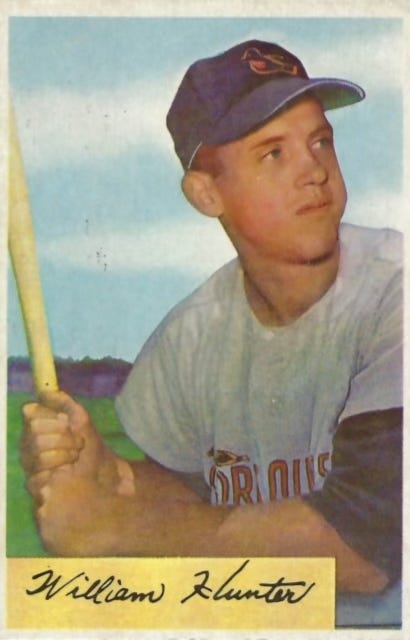The Bird Tapes Interview: Billy Hunter
Before he was a coach for 14 years under Hank Bauer and Earl Weaver, he was the Orioles' first shortstop. He recalls the Birds' first season in Baltimore, when they lost 100 games and no one cared.
The St. Louis Browns didn’t bring much in the way of winning talent when they came to Baltimore and became the Orioles in 1954. They’d lost 100 games in 1953 and at least 90 games for seven straight years.
But they did have a shortstop. As a 25-year-old rookie in 1953, Billy Hunter had played in every game for the Browns and made the American League All-Star team.
Hunter, thus, became the Orioles’ first shortstop. He was in manager Jimmy Dykes’ lineup when the Orioles played their first-ever game, in Detroit, on April 13, 1954. (They lost, 3-0.) The same was true when the Orioles played their first home game at Memorial Stadium two days later. (They beat the Chicago White Sox, 3-1.)
His hold on the position was brief, it turned out. After he led the American League in errors by a shortstop in 1954 and hit .243 with just 16 extra-base hits in 451 plate appearances, Hunter was traded to the New York Yankees as part of the 17-player deal engineered by Orioles manger/GM Paul Richards.
Eventually, after his playing career ended, he returned to the Orioles as a third base coach in 1964 and stayed for 14 years, becoming a key part of the club’s winning chemistry under managers Hank Bauer and Earl Weaver. Although Bauer, Hunter’s former teammate on the Yankees, was the one who brought him back to Baltimore, Weaver especially loved his focus on fundamental play.
But when I interviewed Hunter for my book on Orioles history a quarter-century ago, I didn’t spend much time collecting his views on the club’s glory years. I already had a surplus of individuals doing that.
What I didn’t have and sorely needed was an eyewitness to the Orioles’ first year in Baltimore. I had located a few members of the 1954 team such as pitchers Duane Pillette and Mike Blyzka and infielder Bob Kennedy, but we’d only spoken on the phone, and not for that long. Ernie Harwell, the Orioles’ first radio broadcaster, was helpful. But Hunter was like found gold for me. In 1999, he occupied an office about a mile from my house as the athletic director at what is now Towson University.
Listening to the recording of our conversation a quarter-century later, as I recently did before publishing this post, I couldn't recall exactly where we were on Towson’s campus when we spoke. A cafeteria? A hallway? Sounds like it. But regardless, it’s easy to hear Hunter’s memories of the 1954 season, starting with the Orioles’ inaugural spring training camp in … wait for it … Yuma, Arizona.
If you aren’t familiar with what happened in 1954, well, Baltimore threw the players a parade before the Orioles’ first home game; Memorial Stadium had a hedge, not a fence, in deep center field, seemingly miles from home plate; and one of the biggest promotions wasn’t a bobblehead or floppy hat giveaway but Interfaith Night. The Orioles weren’t very good — they went 54-100 — but drew more than a million fans. The Browns had drawn less than 300,000 in their last year season in St. Louis.
It was a decidedly different era in baseball, not least in how shortstops were perceived. Defense was pretty much all that mattered; clubs usually tolerated paltry hitting from a shortstop who could command an infield and make all the plays.
Hunter exemplified his era. His high error total in 1954 was misleading; he was a strong fielder with above-average range. (He also ranked among the league leaders in doubleplays turned as a shortstop.) He’d worked his way through the Brooklyn Dodgers’ stacked minor league system in the late 1940s and early 1950s, showing enough promise at one point that the Dodgers saw him as a possible eventual replacement for Pee Wee Reese, their longtime shortstop. But Hunter eventually was traded to the lowly Browns for three players and $95,000, quite a haul.
Although he hit just .219 over his six-year major league career, when he retired as a player he could say he’d been an All-Star and played on a World Series-winning team (with the Yankees in 1956). Later, after his long run as a coach in Baltimore, he had a shot at managing in the major leagues with the Texas Rangers in the late 1970s.
He checked all sorts of boxes in the game, among them being the first Oriole at a position that eventually also was manned by Luis Aparicio, Mark Belanger, Cal Ripken Jr., Mike Bordick and J.J. Hardy — quite a roll call.
(Note: You can click on this link to upgrade to a paid subscription to the Bird Tapes, which would enable you to hear my interview with Hunter as well as my entire archive of vintage interviews with Orioles legends.)
Keep reading with a 7-day free trial
Subscribe to The Bird Tapes to keep reading this post and get 7 days of free access to the full post archives.





